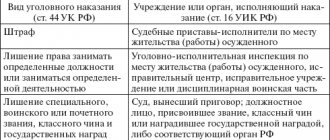The procedure for executing a court decision in a criminal case is regulated by Art.
393 of the Code of Criminal Procedure of the Russian Federation. Issuing an act and forwarding it further within the jurisdiction are the final stages of criminal proceedings. Participating in this activity are: the court, when executing acquittal verdicts or orders for the release of the defendant in the courtroom. Bodies of the executive system (transmit to the court information about the conditions of stay of convicts, their illnesses, disability and other data). The prosecutor's office (supervises the process) and public structures (initiate the early release of the sentenced person). Multi-channel free hotline Legal advice on criminal law. Every day from 9.00 to 21.00
Moscow and region: +7 (495) 662-44-36
St. Petersburg: +7 (812) 449-43-40
What is Article 393 of the Code of Criminal Procedure about?
Compliance with the verdict passed by the court guarantees the inevitability of punishment for an action committed by a citizen that led to irreversible consequences in relation to the rights of subjects. The verdict is the main act of legal proceedings, determining the subsequent fate and status of a person. Article 393 of the Code of Criminal Procedure regulates the stages and legality of the execution of sentences and appeals to court.
Several departments are involved in the process of completing the case:
- court - when executing verdicts regarding acquittals, orders for the immediate release of a citizen from custody in the courtroom;
- body of the executive system - to transmit information about the conditions of detention of the prisoner, the presence of illness, disability, and other individual information;
- the prosecutor's office - in terms of monitoring the progress of the process;
- public organizations and structures can act as initiators of the early release of a convicted person.
The obligation to execute the verdict of the Code of Criminal Procedure is assigned to the court considering the case on the merits, even if the results are contested and transferred to higher authorities (after a court decision is made).
Presentation and main provisions
The procedure for applying a sentence for execution under the main provisions of Art. 393 Code of Criminal Procedure of the Russian Federation:
- In terms of execution of the sentence and determination of the penalty, the responsibility rests with the court that accepted the case for consideration in the first instance.
- Regarding the execution of the punishment, the responsibility is assigned to the body where a copy of the guilty verdict is sent, signed by the presiding judge. The verdict on property penalties is sent to the bailiff. The writ of execution (with a copy of the verdict) can be sent in the form of an electronic document with mandatory certification by a qualified electronic signature. The procedure is approved by the legislation of the Russian Federation:
- if the verdict establishes a decision for the convicted person to independently proceed to the place of serving the sentence (clause 11, part 1, article 308 of the Code of Criminal Procedure of the Russian Federation), then a certified copy of the verdict is sent to the penal system of the territorial body;
- if it is necessary to ensure security, in cases regulated by the Federal Law, copies of documents are sent to the executive body of regional significance or authorized bodies in charge of cases of Russian citizenship.
- when imposing penalties as the main or additional type of criminal punishment, in order to guarantee the receipt of income to the federation budget, a copy of the part of the conviction (the operative section) is sent to the body entrusted with the responsibilities of administering the federation budget revenues, in accordance with the budget legislation of the Russian Federation.
- The appellate court makes a decision regarding a citizen held in custody and transmits documents about the decision to the bodies and institutions entrusted with the execution of the sentence of the Criminal Procedure Code.
If the sentence is changed by the court of the first instance of appeal when considering a criminal case in cassation (after filing an appeal), a copy of the decision (determination of punishment) of the court of appeal must be attached to a copy of the original sentence.
- After transferring the documents of the court decision to the bodies or institutions responsible for the execution of the sentence, the latter must and immediately notify the court about the execution of the sentence. The notice is sent to the court that issued the guilty verdict. Also, the duties of the body executing punishment include timely notification of the court about the place where the convicted person is serving his sentence.
In what cases is it used?
In accordance with the Federal Law, a procedure is established for the practical implementation of acts of criminal law: sentence, ruling, court ruling. The verdict must be carried out within 3 days. Art. applies. 393 both in the case of serving a sentence in places of deprivation of liberty, and in cases of recovery of material damage.
A photocopy of court decisions must be sent to the penitentiary authorities and the bailiff service. The authorities responsible for implementing the orders are obliged to inform the court about the fact of the commencement of actions and the place where the convicted person is serving the coercive measure.
Article 393 – procedure for applying for execution of a sentence, ruling, court order
The implementation of a judicial verdict helps to strengthen the principles of inevitability of responsibility for a crime, legality, and respect for the rights of subjects.
Chapter 46 of the Code of Criminal Procedure of the Russian Federation establishes the procedure for the practical implementation of criminal legal acts:
- sentences;
- definitions;
- resolutions.
A verdict is the main act of criminal proceedings, issued by the court at the end of the investigation of the case. It determines the future status and fate of a person.
The duty to enforce the sentence of the Code of Criminal Procedure rests with the court that considered the criminal case on its merits, even if it was later appealed to higher judicial authorities.
The verdict is carried out within three days.
A photocopy of it is sent to the authorities authorized to carry out activities related to the implementation of criminal penalties. If the text of the decision provides for penalties of a material nature, then together with a copy of the verdict (ruling, resolution) the enforcement document is sent to the bailiff service. Correspondence may be transmitted via electronic communication. All decisions made by higher authorities are attached to a copy. Institutions directly involved in punishment inform the court about the fact that the decision has come into effect and the place where the person is serving the coercive measure.
Comments on Article 393 of the Code of Criminal Procedure of the Russian Federation
Considering Art. Federal Law on the procedure for applying for the execution of sentences, the current Code and comments should be taken into account. In terms of appealing the sentence for execution, the Code of Criminal Procedure of the Russian Federation explains the need for an order to begin activities to implement orders for execution by the court in the following cases:
Peculiarities of the procedure for deciding and pronouncing a verdict under the Code of Criminal Procedure of the Russian Federation, Article 310
- the implementation of punishment is separated from justice and entrusted to non-judicial bodies;
- the absence of obstacles to the implementation of punishment, the need to resolve issues related to the execution of the sentence in court.
In specific individual cases, the order to initiate the effect of court decisions is carried out by employees of the judicial apparatus with mandatory monitoring of the progress of implementation by the judge, the chairman of the court considering the criminal case.
When sending verdicts to various bodies and institutions, it is necessary to certify copies of acts with the signature of the judge, secretary, and the stamp of the official seal.
Any changes made to the document or amendments are noted in the copy. Copies of the copies on the basis of which amendments were made are attached to the main document. The package of documents is supplemented by a letter, signed and certified. The letter is attached to the criminal case.
Work on a criminal case is completed after receiving from the penitentiary structures an official notification of the adoption of basic and additional coercive measures, as well as satisfaction in terms of penalties under civil law acts. After completion, the case is removed from control by the courts and transferred to the archive.
What does judicial practice show under this article?
The general procedure for deciding to execute a sentence is in accordance with the Code of Criminal Procedure of the Russian Federation, and is regulated by:
- Instructions for record keeping adopted by the Judicial Department of the Supreme Court of the Russian Federation;
- Federal Law “On Criminal Executive Proceedings”;
- Code of Criminal Procedure of the Russian Federation;
- PEC of the Russian Federation.
All judicial acts that enter into legal force immediately, as well as after the expiration of the deadline for filing a complaint, are subject to execution - if this is regulated by the legislation of the Russian Federation. After the verdict enters into legal force, a card in form No. 6 is filled out for the citizen convicted by a court decision, which is transferred to the department of the law enforcement agency, from where materials on the criminal case are sent.
What decisions are most often made under Article 393 of the Code of Criminal Procedure of the Russian Federation?
The general mechanism for enforcing acts is not regulated; it all depends on the type, type of sanctions imposed, and the need to isolate the convicted person from society. When the court applies to the implementation of a sentence, the penal system is obliged to monitor the progress of the process.
What is a suspended sentence and punishment - Article 73 of the Criminal Code of the Russian Federation
The judge decides on the measure of restraint or punishment. Decisions may be about complete or partial isolation of the convicted person, house arrest, undertaking not to leave the state, fines. When a sentence of imprisonment is carried out, the documents are sent to the pre-trial detention center where the defendant is being held. The duties of the head of the pre-trial detention center include notifying the relatives or friends of the convicted person about the place where the sentence will be served.
If a citizen is not charged with staying in a detention center, the verdict is sent to the supervisory authorities for the execution of punishments at the citizen’s place of registration.
A person who is allowed to independently get to the institution for serving his sentence (colony-settlement) receives an order from the correctional institution, where the documents are sent. The convicted person should come to receive instructions and strictly follow them.
When a sentence is suspended, decisions are sent to the department of the executive penal system. There must be two documents: the resolution goes to the territorial department of the inspectorate for supervision over the execution of punishments (at the citizen’s place of registration), as well as to the police department. The decision is also transmitted to the department of internal affairs when the deferment period expires.
The criminal-executive inspection bodies are the supervisory authority for the execution of all sanctions, except imprisonment. Judgments are transmitted in the form of a copy, including an order obliging the convicted person to appear for instructions on a strictly specified date.
For persons under 18 years of age, copies of decisions are sent to the Commission on Minors' Affairs, for military personnel - to military registration and enlistment offices and the military prosecutor's office.
Failure to comply with court orders
In terms of aggravating circumstances, there are failures by the convicted person to comply with court orders. The citizen ignores the obligation to appear at the police department for orders and violates the order established by judicial legislation. If search measures are taken against a convicted person, this aggravates the person’s fate and can be regarded as evasion or escape. In this case, the court imposes an additional punishment.
A measure that alleviates the severity of serving is the exact fulfillment of all requirements. In terms of paying off the financial burden, this means timely payment of funds; in terms of serving a sentence in prison, it means maintaining the routine and rules established in the institution.
It should be noted that the courts are favorable to subsequent petitions to change the punishment, to alleviate the fate of the convicted person only if all instructions are strictly and timely fulfilled. To make decisions that reduce the level of punishment, the convicted person may file a petition addressed to the court within the time limits established by law.
Everything about criminal cases
Go to the text of the Code of Criminal Procedure
Url Additional information:
Appeal to execution
— Part 1 393 Code of Criminal Procedure
enforcement is assigned to the court of first instance
Copies of the verdict
(entered into force)
— Part 1.1 393 Code of Criminal Procedure
convict, defense lawyer, prosecutor - 3 days from admission
— Part 1.1 393 Code of Criminal Procedure
sent to the administration of the pre-trial detention center for delivery to the convicted person
— Part 1.1 393 Code of Criminal Procedure
if not appealed - 3 days from the date of entry into force
— Part 1.1 393 Code of Criminal Procedure
other participants are given copies upon request
Copies of the verdict to the executive authorities
— Part 2 393 Code of Criminal Procedure
the sentence is sent by the court to the body executing the punishment
— Part 2 393 Code of Criminal Procedure
for property recovery - writ of execution
— Part 2.1 393 Code of Criminal Procedure
if independent, a copy of the verdict in the Federal Penitentiary Service
— Part 2.2 393 Code of Criminal Procedure
in special cases, to the citizenship authority
— Part 2.3 393 Code of Criminal Procedure
when imposing a fine, a copy of the verdict to the budgetary authority
Guarded
— Part 3 393 Code of Criminal Procedure
the court of appeal notifies the pre-trial detention center of the entry into force
— Part 4 393 Code of Criminal Procedure
in case of change in cassation, a copy of the decision is attached
The authority notifies the court
— Part 5 393 Code of Criminal Procedure
the executing authority notifies the court of the execution of the punishment
— Part 6 393 Code of Criminal Procedure
the executive body notifies the court of the place where the sentence will be served
Article 393 of the Code of Criminal Procedure. The procedure for applying for the execution of a sentence, ruling, court order
1) Appeal to the execution of a sentence, ruling, or court decision is entrusted to the court that considered the criminal case in the first instance.
1.1)
Within 3 days from the date of receipt of a copy of the appeal verdict, ruling or resolution by the court that passed the sentence or made another final judicial decision, a copy of the sentence, ruling or court decision that entered into legal force, and a copy of the appeal verdict, ruling or resolution are handed over to:
- convicted or acquitted,
- to his protector
- and the accuser,
- and are also sent to the administration of the place of detention, the administration of the place of serving the sentence for delivery to the convicted person in custody.
Url Additional information:
- part 1 390 of the Code of Criminal Procedure
the sentence comes into force on the day the appeal period expires
If the verdict or other final court decision has not been appealed, then copies thereof are handed over to the convicted or acquitted person, their defense attorney and prosecutor, and are also sent to the administration of the place of detention, the administration of the place of serving the sentence for delivery to the convicted person in custody within 3 days from the date entry into force of a sentence or other final court decision.
Within the same time frame, copies of court decisions may be served on the victim, civil plaintiff, civil defendant and their representatives upon request of these persons.
Url Additional information:
- Part 4 390 Code of Criminal Procedure
the sentence is executed within 3 days from entry into force
- Part 4 390 Code of Criminal Procedure
executed within 3 days from the return of the case from appeal
2) A copy
of the conviction is sent by the judge or the chairman of the court to the institution or body entrusted with the execution of the punishment.
Url Additional information:
— part 3 of article 103
N 229-FZ initiation of enforcement proceedings in 3 days
To execute a sentence, ruling, or court decision regarding property penalties, a writ of execution is sent to the bailiff along with a copy of the sentence, ruling, or court decision. The writ of execution, together with a copy of the verdict, ruling, or court order, can be sent by the court for execution to the bailiff in the form of an electronic document signed by the judge with an enhanced qualified electronic signature in the manner established by the legislation of the Russian Federation.
2.1) If the sentence contains a decision on the convicted person to independently proceed to the place of serving the sentence, adopted in accordance with paragraph 11 of Part 1 of 308 of the Code of Criminal Procedure, a copy of the sentence is sent by the judge or the chairman of the court to the territorial body of the penal system.
2.2) In cases provided for by federal law, a copy of the conviction is sent to the federal executive body in the field of security and (or) the authorized bodies in charge of cases of citizenship of the Russian Federation.
2.3) If a fine is imposed as the main or additional type of criminal punishment in order to ensure the flow of income into the federal budget, a copy of the operative part of the conviction is sent to the state body that is the administrator of federal budget revenues in accordance with budget legislation.
Url Additional information:
— Part 1 75 PEC
dispatch of the convicted person no later than 10 days
3)
The appellate court is obliged to inform the institution or body entrusted with the execution of the punishment about the decision it made in relation to the person in custody.
4) If the verdict of the court of first or appellate instance is changed when considering a criminal case in cassation, a copy of the ruling of the cassation court is also attached to a copy of the verdict.
5) The institution or body entrusted with the execution of the punishment shall immediately notify the court that rendered the guilty verdict of its execution.
Url Additional information:
- Part 3 20 PEC
notification of the court about the beginning and place of serving sentences
6) The institution or body entrusted with the execution of the sentence must notify the court that passed the sentence about the place where the convicted person will serve the sentence.
Return to the text of the Code of Criminal Procedure
Seek advice




